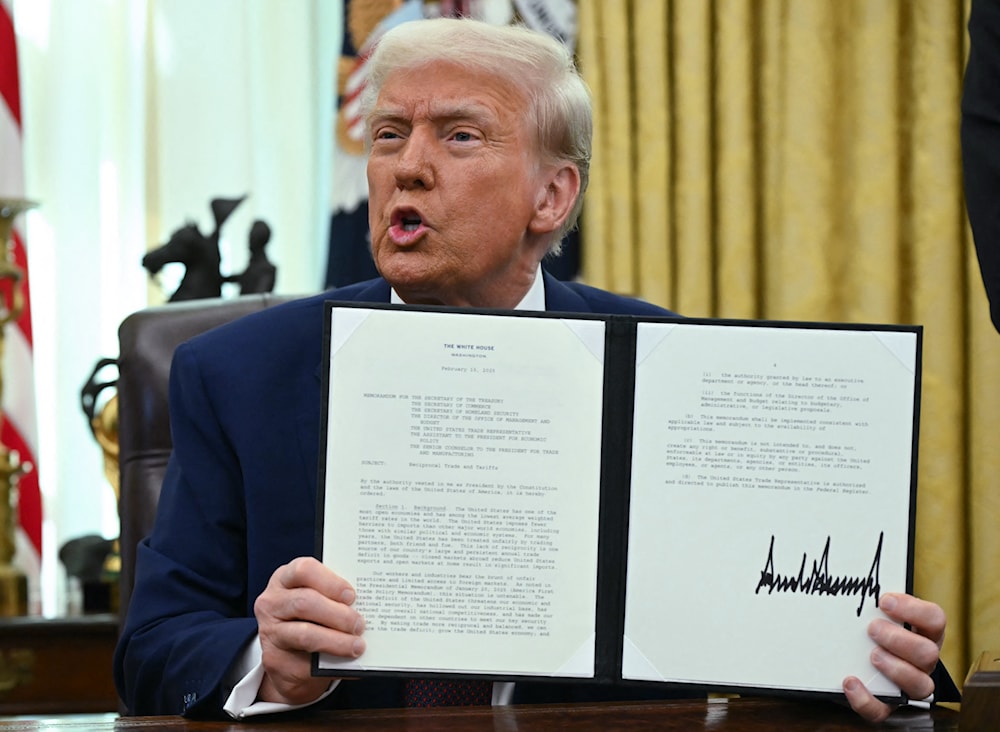Trump says would like talks with Russia, China on defense spending
The US president signs plans for expansive "reciprocal tariffs" that could affect both allies and adversaries, escalating an international trade dispute that economists warn could drive inflation.
-

US President Donald Trump speaks while showing the executive order on reciprocal tariffs he signed in the Oval Office of the White House in Washington, DC, on February 13, 2025 (AFP)
BRICS nations could face 100% tariffs from the United States if they "play games with the dollar," US President Donald Trump warned on Thursday.
"If any trading gets through, it'll be 100% tariff, at least," Trump stated in response to a question about the BRICS nations - Brazil, Russia, India, and China - developing their own currency.
Additionally, he accused Taiwan of taking away the US semiconductor chip industry, vowing to reclaim it.
Trump also reiterated his desire for Russia’s reinstatement in the Group of Seven (G7), calling Moscow’s expulsion a mistake. Russia had been part of the G8, a group of leading industrialized nations, until it was excluded in 2014 after Crimea became part of the Russian Federation.
During his first term, Trump called for Russia’s readmission but received little support from other Western nations.
"I'd love to have them back. I think it was a mistake to throw them out. Look, it's not a question of liking Russia or not liking Russia. It was the G8," Trump said at the White House.
"I said, 'What are you doing? You guys - all you're talking about is Russia and they should be sitting at the table.' I think Putin would love to be back," he added.
There was no immediate response from Canada, which holds the G7 presidency this year.
Trump says he would like discussions with Russia, China on defense spending
Trump also announced his intention to hold discussions with Russia and China on mutual reductions in military expenditures, proposing a potential summit between the three nations.
He stated he would consider a meeting with Russian President Vladimir Putin and Chinese President Xi Jinping "when things calm down."
"When we straighten it all out, then I want one of the first meetings I have is with President Xi of China, President Putin of Russia. And I want to say, let's cut our military budget in half."
"There's no reason for us to be building brand new nuclear weapons," he indicated.
Trump unveils ‘reciprocal tariffs’ targeting allies and rivals
On Thursday, Trump signed plans for expansive "reciprocal tariffs" that could affect both allies and adversaries, escalating an international trade dispute that economists warn could drive inflation.
During his campaign, Trump vowed, "An eye for an eye, a tariff for a tariff, same exact amount."
Speaking from the Oval Office, Trump justified the tariffs by criticizing US allies for being "worse than our enemies" in trade policies. He singled out the European Union, calling it "absolutely brutal" in its trade relations with Washington.
According to a senior White House official, the tariffs will be tailored to each US trading partner, considering existing tariffs imposed on American goods, as well as discriminatory measures like value-added taxes (VATs).
Following Trump’s directive, the US trade representative, commerce secretary, and other officials will develop country-specific trade remedies, initially focusing on nations with the largest US trade deficits or the most significant concerns.
"This should be a matter of weeks, in a few months, but not much longer than that," the official noted.
Before Trump’s announcement, trade advisor Peter Navarro told reporters, "Major exporting nations of the world attack our markets with punishing tariffs and even more punishing non-tariff barriers."
With inflation a key issue in the recent election that saw Trump return to office, he has pledged to lower prices swiftly. However, economists caution that broad tariffs on imports could instead drive inflation higher in the short term and potentially slow economic growth.
Trump acknowledged on Thursday that tariffs could cause a temporary price increase but expressed confidence that costs would eventually decline.
Since taking office, Trump has introduced a wide range of tariffs on major US trading partners, arguing they address unfair practices and, in some cases, serve as leverage to influence foreign policy.
He has consistently framed tariffs as a tool for revenue generation, correcting trade imbalances, and pressuring countries to address US concerns.
On Thursday, a senior White House official reiterated that the US has been "treated unfairly" in trade, citing a lack of reciprocity as a key factor behind the country’s persistent goods trade deficit, which exceeded $1 trillion last year.
One specific issue raised was the EU’s 10% tariff on US vehicles, while the US imposes only a 2.5% tariff in return.
Trump also criticized certain European nations for imposing a 20% VAT tax, with Navarro describing the EU as the "poster child" for unfair trade practices against the US.
The announcement came ahead of Trump’s scheduled meeting with Indian Prime Minister Narendra Modi in Washington.
Read more: Trump demands 'radical' Reuters return $9mln to US gov.

 5 Min Read
5 Min Read








